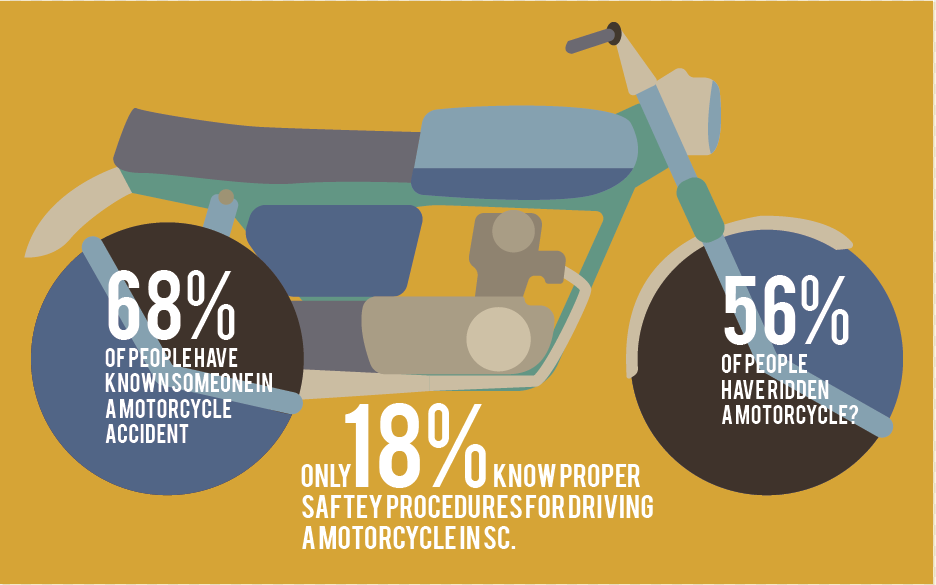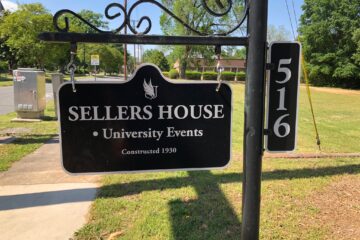South Carolina has become one of the most unsafe places for motorcyclists. The fatality and mortality rates reach some of the highest in the nation, according to a study done by the Auto Insurance Center.
A team at Fatality Analysis Reporting System decided to conduct a study to find out “how many motorcycle crash-related fatalities happen across the country,” Nina Krstovic, a junior media relations associate at FARS, said.
Krstovic said that South Carolina ranked as one of the highest in both fatality and mortality rates. She said that the lack of a helmet law has caused numbers of accidents to skyrocket.
“South Carolina has the highest motorcyclist fatality rate relative to all registered motor vehicles, per 100K. South Carolina also has the second highest motorcyclist mortality rates relative to all registered motorcyclists, per 100K. As a state without U.S. helmet laws, SC sees 72 percent of unhelmeted motorcyclists in fatal accidents—that’s 55 percent more than the U.S. average,” Krstovic said.
Gracie Holtzclaw is a senior social work major who has been riding motorcycles for a year. She said that she started riding motorcycles because she wanted to find a hobby and had previous experience with motorcycles thanks to her family and friends.
She went through the Harley–Davidson dealership instead of the DMV because she said that it was easier and she was able to take a class to learn about motorcycle riding and safety.
Holtzclaw said that motorcyclist must go through a very rigorous course and sometimes fail on multiple attempts, because the dealerships and DMV’s are preparing motorcycle riders for the dangers of the road.
“They prepare you… It’s like with driver’s ed[ucation], but with a bike,” Holtzclaw said.
In a survey conducted of 50 Winthrop students, 56 percent of people said they have ridden a bike, but only 18 percent of people knew about proper safety procedures for driving a motorcycle in South Carolina. Holtzclaw said that she would like to see that change and would like for more people to be cautious of bikers and other people on the road.
She also said that accidents happen all the time for motorcyclists but it’s often the lack of attention from drivers in cars that causes the bikers to be injured. She said that anyone considering riding a motorcycle should be properly educated about and safety and wear a helmet.
“It’s not if you’re going to be in an accident on a bike, it’s when you’re going to be in an accident, and you need to have safety gear before even getting on a bike,” Holtzclaw said.
Jessica Downs, a senior marketing major, has been riding a motorcycle since middle school, because her dad decided to teach her how to ride. She said that drivers are unaware of the other people on the road and it’s the reason her parents were involved in a car accident.
“He [my dad] broke three ribs he was not wearing a helmet and neither was my mom, but the way they crashed a helmet would not and did not make a difference. Other drivers on the road need to pay attention. We, on two wheels, are the smallest things on the road and we keep a 360 eye out for other cars because they simply ‘don’t see us,’” Downs said.
Holtzclaw said that someone pulls out in front of her every day and she has to be extremely cautious of others on the road while also paying careful attention to the roads and potholes. She also said that the government should take initiative with the state’s helmet and safety laws more.
“No one takes into consideration motorcycle drivers, and our roads are awful… If you’re over the age of 21 you don’t have to wear a helmet… I think it needs to be more strict,” Holtzclaw said.
According to Section 56-5-3660 of Article 29 on South Carolina motorcycle laws, anyone under 21 must wear a helmet at all times while riding a motorcycle. Downs said that she is grateful for this and thinks that the age limit is necessary for children and young adults, but she said that helmets are not always beneficial.
“In times yes it is ‘safer’, but not necessarily, because at nighttime if you can’t see everything around you then people definitely can’t see you and you don’t need to be wearing that helmet,” Downs said.
Both Holtzclaw and Downs spoke about the “Look Twice, Save a Life” campaign and how it seeks to educate drivers about motorcycle awareness and ensure that people are looking multiple times before turning or changing lanes, because of the possibility of hitting a biker.
Downs said that she would like to see the campaign implemented in more places, especially around South Carolina to inform drivers about motorcycle safety and cautiousness.
“You can’t force people to look, all you can do is ticket them… I do like that that [Look Twice, Save a Life] is becoming more of a promotion, so that motorist can see that. I feel like the best way to ensure that motorist can see Look Twice, Save a Life is to put them in car dealerships. I feel like they should start adding that on to the DMV to get your learner’s permit,” Downs said.
In the survey of Winthrop students, 68 percent said they have witnessed a motorcycle accident on the road. Lillian Barfield, a junior English major, said that she doesn’t like riding motorcycles, because of the dangers she has seen herself.
Barfield once witnessed a motorcycle accident in which neither person was injured and both were wearing helmets, but she said that people in other vehicles need to pay attention to motorcycle riders so that accidents like that one can be avoided.
“The most frequent accidents that I hear of, or experience through my friends, are caused by reckless drivers or people who just weren’t paying attention. The best way to keep motorcyclists safe is to make sure everyone is treating driving as a life-or-death thing, because it is,” Barfield said.
Holtzclaw said that despite all of the negativity associated with motorcycle riding and the dangers of the road, it is a freeing and empowering experience that continues to draw her and many other people in everyday. She said that it can be a major source of empowerment for women and encourage them to do things outside of the “norm.”
“It makes you feel empowered and like a bada**, especially girl riders. It’s such an empowering thing to be a girl in a male-dominant sport or hobby. I really would encourage more girls to get out there and follow passions and hobbies that are male-centric,” Holtzclaw said.




